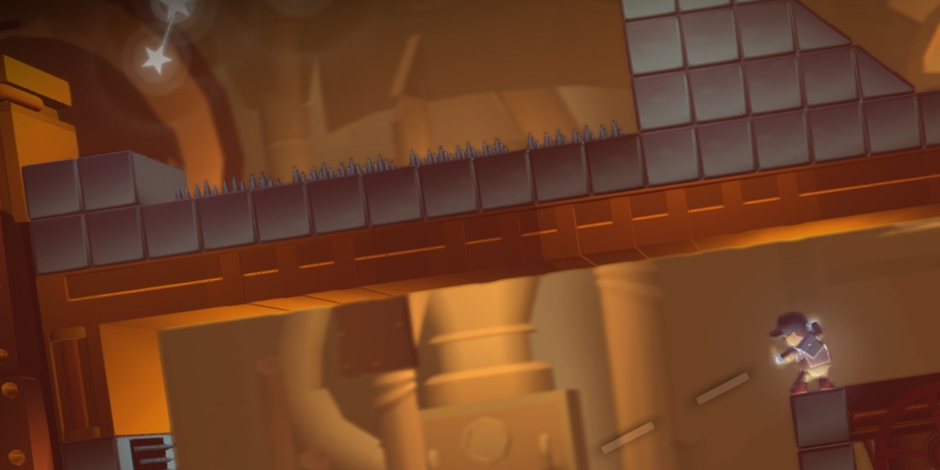GamesRadar+ Verdict
Pros
- +
Inventive puzzles and level design
- +
Moving narrative
- +
Powerful and clever soundtrack
Cons
- -
Strenuous difficulty
- -
Frustrating health system
- -
Lack of drop-in/drop-out co-op
Why you can trust GamesRadar+
Pid tells the story of Kurt, a small boy who must make his way back home after he gets separated from his classmates and ends up on an unknown planet. What he doesn’t realize is that the planet is in distress and finding its salvation is his only means home. Pid’s charming worlds draw you in, but their demanding mechanics of classic platforms make them equally as strenuous to play.
At the start of the game, you’ll receive an item that grants Kurt the ability to create up to two beams of light and alter gravity depending on where he shoots them. Dropping one directly below him, for example, pushes Kurt upward and lets him hover for a short period of time. You’ll be doing a lot of jumping over enemies or onto ledges, so your beam also helps in moving you over various obstacles. If your jumping is off by even just a little, Kurt most likely won’t make it to the other side.
As you might guess, the light beam becomes your main instrument with which to solve Pid’s various puzzles. Most puzzles require you to use your light beam in different ways to reach the door to the next challenge. And while you’ll constantly be using the light beam, the game continually offers new and inventive applications for it. Almost every room you encounter features a new challenge that may take up to a few dozen tries to overcome. It’s not that escape routes are particularly tricky to figure out; and in fact, it’s not, but it’s the game’s precise control demands that make reaching the exit so difficult.
Further frustrating is Pid’s health system: One hit is all it takes for Kurt to die. The game does, however, provide items for protection such as life vests that extend your health and can be purchased with stars you’ll come across. These make surviving a room and making your way out much easier, but they’re not necessary. Constantly having to buy life vests to ensure Kurt’s safety in the more difficult sections, however, is not fun, especially when it’s so easy to use them up. Boss battles, too, while creative in their own right, can take a few tries to complete because you’ll most often enter them with just one bar of health.
To compensate for its difficulty, the game features very generous checkpoints that save your progress as soon as you complete a room. Since you might end up dying 463 times in your playthrough (yeah, the game does keep count), checkpoints are a godsend. These checkpoints also revive your fallen partner when playing co-op, a mode that can be just as challenging since you each only get one light beam and will need to work together to survive. The only downside to co-op is that you can’t drop-in or drop-out once you start a new game.
Behind all those deaths is a moving story about a brave little boy trying to get home all by himself. In one scene that perfectly captures his innocence and vulnerability, Kurt is seen riding alone in a dark elevator when it abruptly crashes down. You can’t help but feel for the protagonist and wonder what his fate might be during these scenes. However, it can be hard to focus on the story when you’re replaying the same room several times in a row. Just when you think you deserve a rest, Pid relentlessly serves you more. Kurt’s many deaths essentially devalue his troubles and the themes the game tries to evoke.

Fortunately, the game’s visual splendor lets you appreciate the more peaceful aspects of Kurt’s journey. You’ll travel to a robotic kitchen, opera house, and even outer space, each with its own palette of vivid colors and soft textures. The game’s visual stylings is further enhanced by its wonderful soundtrack that ranges from classical to rock-and-roll. The game’s emotional force shines through even more during a level that takes place in an underground maze bereft of any enemies or traps and features the haunting, yet powerful, sounds of a saxophone.
After watching the credits roll and finding out how many times you died in the span of nine hours, you’ll realize Pid is a game that takes patience and an appreciation for the more unforgiving elements of platform titles. Dying time and again at the hands of the same trap starts to get old fast. However, there's no denying that the game's puzzles are of the more inventive variety in the platformer genre, and with its quality narrative, Pid's worth getting invested in.
This game was reviewed on the Xbox 360.
More info
| Genre | Puzzle |
| Description | A unique platforming adventure game where players play as a stranded boy on a remote planet, that must fight off malicious robots and befriend unlikely allies in order to face the planet's ruler, who has no intention of letting him leave. |
| Platform | "Xbox 360","PC","PS3" |
| US censor rating | "Everyone 10+","","" |
| UK censor rating | "","","" |
| Release date | 1 January 1970 (US), 1 January 1970 (UK) |



